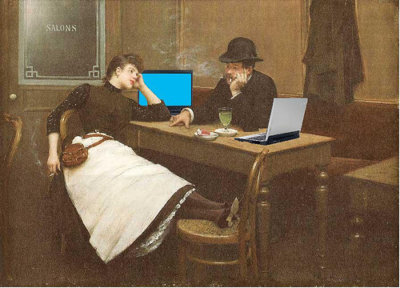Can Online Relationship Counselling Really Work?

By: Mike Licht
by Andrea M. Darcy
In the last few years online therapy has become increasingly popular.
And it’s working. In fact studies show that for some psychological issues like social anxiety, online therapy can even be more effective than in-person counselling.
But what about couples counselling? Is it really possible that online relationship counselling can be as good (or better) than meeting your therapist in person?
How does online relationship counselling work?
Online therapy uses the same setup as any other video conferencing. You are in the privacy of your home, and you call the counsellor you are working with using online or Facetime (or another secure platform you’ve agreed on). All you need is a good internet connection, a working microphone and computer, and your chair.
With online couples counselling, there will of course be two chairs. The idea is to actually call your counsellor together.
Can you do online couples counselling if you and your partner are actually in different locations, or even countries? Yes. Online counselling, for example, can do ‘group’ video calls. This can be useful if you are in a long-distance relationship, one of you are travelling, or you are in the midst of a separation but want to either have a constructive ending or see if you can salvage the relationship.
But doing online relationship couples counselling with your partner and you together in the same room might be more effective – read on for why.
Why couples counselling is a good fit

By: Garry Knight
Therapy is at heart a relationship. The trust that develops between you and your therapist has been found to directly affect the results you get from therapy.
Can this bond of trust form over online? Consider your video chats with family, friends, or partners. Most people say they do feel connected, but that it’s not the same closeness as in-person.
So it’s true that with one-to-one online therapy it can take longer to build a strong connection with the therapist.
But couples therapy is a different situation. The main relationship in the room is no longer between you and your therapist. It’s between you and your partner, with the therapist there to be a sort of convener, helping you communicate constructively. With online couples counselling, you are still usually in the same room with your partner. So there is hypothetically as much of a chance for you and your partner to connect and grow together with online therapy as there is with in-person therapy.
The benefits of online couples therapy
There are many upsides to consider. These include:
1. You save money.
Time is money, and doing therapy from home means you don’t have to travel to and fro from your therapist’s office. And if you have children, assuming they are old enough to play quietly in an adjoining room, it can make a babysitter no longer necessary. This is also the case if you have an elderly parent at home who needs care.
2. You are more likely to both make the appointment.
In-person couples therapy represents two times more chances of something coming up to stop you making a session. Online therapy still works if the babysitter cancels, the car breaks down, the train is cancelled, or even if one of you is poorly. A cold or a bit of flu matters less if you don’t have to leave the house.
3. It means attending each session is not used like a weapon between you.
When a couple is in conflict, therapy sessions can become part of the bargaining. “You better not upset me today or I won’t go to the session tomorrow”. When the sessions are in your own home, these sorts of games lose their power. You are both at home, you might as well do the session.
4. If one partner travels for work, you can still attend therapy.

By: Kate Ter Haar
Many therapists are fine with occasionally working with one partner on a third line (or always, if you live in different countries).
5. You might find you are more open and communicative over online.
Some people find it’s easier to be open in their own home. If, for example, one partner is stressed by transport, is introverted, or has social anxiety, online therapy means half of each session is not wasted dealing with him or her relaxing.
When online relationship counselling might not be right
In some cases, a couple really needs time together in person when working things out. This might be the case if one of you hides from the other with workaholism, and therapy becomes the only real time you are really together. This might also be true for couples who are in a trial separation and living separately.
Of course some therapists are happy to do a blend of therapy formats, with some sessions in person and others online.
Finally, online couples counselling isn’t suitable with just any therapist. It presents its own challenges so requires a couples therapist who knows what he or she is doing.
A good online couples therapist needs to be confident at communicating via video and at reading body language on screen, and able to keep you both engaging with each other without being in the room. Limited benefits will come of therapy together if, for example, you are sitting side-by-side but both just staring at the screen all the time.
Harley Therapy connects you with experienced couples therapists online who can help you wherever you may be (and in-person couples counsellors, too, if that’s what you’ve decided works best for you).
Still have a question about relationship counselling? Or want to share your personal experience of it? Post in our public comment box below.
 Andrea M. Darcy quit a successful career as a screenwriter to follow her true love, self development, and now is a popular mental health writer who has penned thousands of articles. Find her on Instagram for great life tips @am_darcy
Andrea M. Darcy quit a successful career as a screenwriter to follow her true love, self development, and now is a popular mental health writer who has penned thousands of articles. Find her on Instagram for great life tips @am_darcy





I never thought I will ever be in a relationship with this guy I’m dating. I was even trying to find him a girlfriend but it didn’t work. He always said he doesn’t love the girl I was hoping he date, but just one day and another he told me he loves her and I felt hurt. I didn’t like what I heard but I didn’t let him know I was hurt. Without knowing he was attracted to me, he proposed one day to me on phone and I accepted it. But before that he had been confessing his love for me and proposing too but I always took it as a joke. I’m actually the playful type.
Now I’m in a relationship with him and I don’t know why I am dating. When we started going out I didn’t feel I love him till the 7th month i began having so much feelings for him. Now I feel so in love with him but so many things hold me back.
1. He’s not so intelligent. I feel I am clever than he is. He complete his bachelor with 2nd class lower and I am in the final year of my bachelor with a 1st class, though I’m not done with school yet.
2. He acts silly sometimes
3. We have good conversations but we always get stucked unlike some other conversations I have with 3 other male friends of mine.
4. We’re both Christians but I feel his spirituality is not above mine like I expected. I always wanted someone who will help me build up my spiritual life. But my other 3 male friends have this quantity and it hurt me, why my boyfriend is not like that.
5. I am always given him ideas and, he barely does. When I make suggestions he always wants to go by mine and he doesn’t give in his suggestions on things I need him to.
6. Normally I keep our conversation a life, cracking funny jokes which I expect him to be open and be talker like me if it’s only in our conversations.
7. I feel he’s a coward sometimes 🙁
Upon all these, I feel a strong urge in me that makes me believe I love him. I don’t know what to do. For a month now I think about him often unlike the first 6months of our relationship.
Or perhaps I feel attached to him because he’s coming from a good home.
Please help me, I’ve been thinking a lot. I don’t want to make a mistake and regret. I feel I’m over thinking 😞
Hi Nancy, we’d say this is less about him and more about you. You don’t trust yourself, you don’t know what you want (normal, you are very very young) and you seem to want someone to save you, fix you, make you better, make life better. Despite what you might read in novels or see in films, that is not actually what a relationship is for. But somewhere along the line, and this is generally something we learn from our family growing up, you’ve decided that someone else must be more powerful than you, must make you feel better, must even make you more spiritual! The only person who can do all for you that is you. We don’t know you, and we can’t tell you much over the internet based on a comment. But it seems you got involved with him less as you were attracted and more as you couldn’t stand the idea of someone else having him, which is interesting. We think you might find learning about codependency interesting. http://bit.ly/codependentall. And also learn what relationships and love really are (but realise that you are very young, it’s normal to still be learning, to give yourself a break) http://bit.ly/HTrelationshipguide. As for not making mistakes, impossible. It’s the only way most of us learn. And why call it a mistake, why not just call it learning and growing? Finally, this is a lot of overthinking, with a need to be perfect. It might even be you are suffering some anxiety. If you think that might be the case, consider reaching out for some support- most universities offer free to low cost counselling to students.
I need help on what to do right now….I never should have broken up with him….though my happiness was at stake he didn’t respect or valued me though he used to I fell deeply in love with him before now I was scared of loosing him and he assured me I wasn’t going to loose him but now I think I just did am confused I feel hurt….I know he loves me and he was going through something and didn’t want to tell me…pls help me out I don’t want to loose him
Hi Tonia, sounds like a complicated, unstable relationship. We really don’t have a magical answer. This sort of drama happens when we rush into relationships, or when there isn’t good communication. Your happiness should never be at stake, a healthy relationship is not about your happiness being at stake, your happiness has to come from within you and not be dependent on a relationship otherwise it’s codependency. We recommend you read our guide to healthy relationships http://bit.ly/HTrelationshipguide
Dear Harley,
My name is Emmanuel, I was in a relationship for about 4 years and my partner messed up, got herself involved with some other guy and got pregnant for him so we broke up. After few months I moved on with a new lady and we have been in a relationship for about 2 years now. We are about to get married but here’s the case, I still have huge feelings for my ex- though she tried coming back to me but I was already in love with some other girl now I still love my ex-girlfriend.l but I also love my current girlfriend.
Tried my possible best to forget about her ( my ex-girlfriend ) but it proved abortive and I’m now in the state of dilemma please what should I do now because I don’t want to break the heart of the girl I’m in a relationship with now.
Thanks.
Regards.
Emmanuel.
Hi Emmanuel, that is a big situation. The only person who can decide what to do is you. It is, after all, your life. We’d say it sounds like a lot of drama. Some people have an issue with sabotage. When they go to move forward in life they find ways to sabotage, such as drama. Others are addicted to drama, it makes them feel alive. And still others have intimacy issues, and hide from being fully intimate by always having an ex in the back of their mind. In any case, we recommend you read our guide to healthy relationships it might give you ideas https://www.harleytherapy.co.uk/healthy-relationships-help-guide.htm
Hi plz my name is bola and I felt I need help have been in a relationship for about 9yrs now and now I guess am tired of the relationship I love my girlfriend but with the situation that surround things it doesn’t seems like its gonna work out coz I still have about 3yrs more to finish in school and I don’t reply wanna loose her coz shes actually a good lady don’t no if I can still see some1 like her what should I do?
Hi Bola we aren’t quite clear what the problem is. You are tired of the relationship, does that mean you want to leave it? How does being in school relate? It sounds a complicated situation. We’d advise booking with an online therapist and having a chat about it.
Hello Mj. I need your help, i have been in a relationship with this man for 2 years now and he recently proposed and i said yes. the thing is he is in such a hurry to tie the knot. He has proposed in the past but i wasn’t ready at the time. So, what worries me is we have been in a long distance relationship since i school in a different country, thus we see each other on school holidays when i am home and once in a while we visit in between. last December we tried staying together for the first time and now i am not so sure i want to marry him. he has such annoying habbits, see i am more or less a germaphobe and a neat freak and he is such a slob. i dont mind doing all the cleaning but i absolutely hate it when he leaves a mess whenever he sits and doesn’t tidy up. he also likes bringing his friends to his house without even warning me and they sometimes spend the night. he thinks i am overeating when i talk to him about these. am i? these things make me think twice about marrying him
Hi Kimberly, things like him being messy and you not liking it don’t worry us. What does worry is that he brushes off your concerns. Are there communication issues between you? Just to say that what matters in a relationship is not if someone is tidy and the other isn’t. What matters is that you share values and respect each other. What about him attracts you? What made you say yes? What are his good points? What are your values, the things that deeply matter to you? Does he share them? Can you be yourself around him? you’d need to look at the full picture and judge for yourself. We recommend you read our article on healthy relationships https://www.harleytherapy.co.uk/healthy-relationships-help-guide.htm
Your blog post was thought-provoking and intellectually stimulating. I enjoyed the way you challenged conventional thinking and presented alternative viewpoints. To explore more, click here.